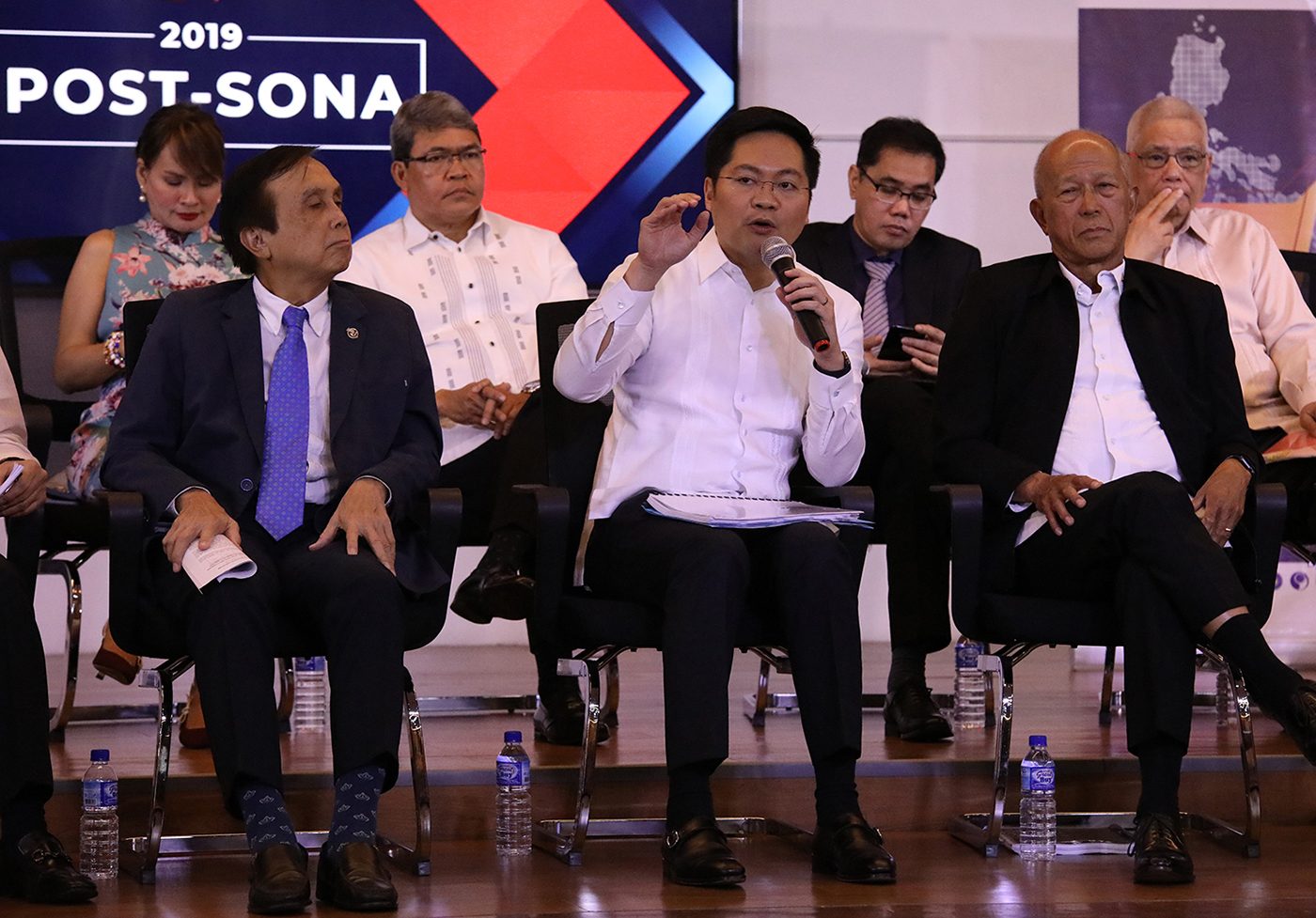SUMMARY
This is AI generated summarization, which may have errors. For context, always refer to the full article.

MANILA, Philippines – As the government gears up for the next full Legislative-Executive Development Advisory Council (LEDAC) meeting, Cabinet Secretary Karlo Nograles listed down some bills the Duterte Cabinet wants passed during the 18th Congress’ 1st regular session.
Nograles, speaking at a press conference on Wednesday, August 21, said these bills were identified by the 6 clusters of the Duterte Cabinet as priority legislation.
They will be discussed during the next full LEDAC meeting which he said may take place in September, after President Rodrigo Duterte’s visit to China.
Here’s a list of bills Nograles mentioned, and a brief description of what they aim to do:
Amendments to Human Security Act – Security officials want this anti-terrorism law amended to allow the warrantless detention of suspected terrorists for more than the current 3 days. Senator Panfilo Lacson’s version of the bill gives 14 days while Defense Secretary Delfin Lorenzana wants 30 to 60 days.
Philippine maritime zones bill – This proposed law, previously filed by former senator Antonio Trillanes IV, defines the Philippines’ maritime zones and the country’s rights over them with the goal of averting disputes with foreign vessels.
Military and uniformed personnel pension reform bill -The measure seeks to reform the pension system for military and uniformed personnel and raise the pensionable age from 56 to 60. Back in February, Malacañang had said Duterte would certify the measure as urgent.
Budget modernization bill – This institutionalizes annual cash-based budgeting which requires government agencies to implement contracts by the end of the budget year, instead of a multi-year obligation-based budget system. Economic advisers say this means more disciplined and efficient spending, which would result in more funds for other programs.
Salary Standardization 5 – A law that allows for the 5th tranche of increases in the salaries of government workers.
Freedom of information (FOI) bill – A law which orders government entities in the executive, legislative, and judicial branches to release documents and records of public interest. Senator Grace Poe has refiled her version of the bill which also states that no request for information should be denied by government unless it involves national security, law enforcement, foreign affairs, and trade secrets.
Tax Reform for Attracting Better and High-Quality Opportunities (Trabaho) bill – Backed by Duterte’s economic managers, this bill seeks to lower corporate income tax to 20% from 30% and rationalize tax incentives by making them performance-based, targeted, time-bound, and transparent.
Amendments to Foreign Investments Act – Some amendments proposed are for the easing of restrictions on foreign direct investments and updating the law to reflect technological advances and the globalized nature of economies. Duterte’s economic managers want to exclude the practice of professions from the law’s coverage so that restrictions apply only to equity investments by foreigners.
Open access in data transmission bill – This measure will make it easier for data transmission and internet service providers to operate in the Philippines, thus increasing competition which could lead to better quality and more affordable telecommunications services.
Amendments to Public Service Act – In another bid to woo foreign investors, one amendment to this law backed by economic managers is limiting the definition of “public utility” to the transmission of electricity, distribution of electricity, and waterworks and sewerage systems. Under the Constitution, at least 60% of public utility enterprises’ capital stock must be owned by Filipino citizens or corporations.
Amendments to Retail Trade Liberalization Act – The amendments take away barriers to foreign investments by easing equity and capitalization requirements.
Excise tax on alcohol – This new sin tax measure will impose higher excise tax on alcoholic drinks, both to bring in more funds for the universal health care law’s implementation and to discourage alcohol consumption. The House of Representatives just passed its version of the bill on Tuesday, August 20.
Pondo sa Pagbabago at Pag-asenso (P3) bill – The measure will institutionalize the P3 program of the Department of Trade and Industry which provides loans to microentrepreneurs at an interest rate of 2.5% per month. The program aims to fight the abusive 5-6 lending scheme many small entrepreneurs resort to.
Creation of Department of Water Resources or Water Regulatory Commission – The two bodies aim to better manage the country’s sources of water and prevent water shortages.
Amendments to Bank Secrecy Act – Seen as an anti-corruption measure, proposed amendments include taking away the confidentiality of bank account deposits of all elected or appointive government officials, government employees, military, police, and other uniformed personnel, and employees of government corporations. Other amendments involve allowing the examination of all deposits for legislative investigations, and probes by the Bureau of Internal Revenue, Anti-Money Laundering Council, and other financial regulators.
– Rappler.com
Add a comment
How does this make you feel?
There are no comments yet. Add your comment to start the conversation.